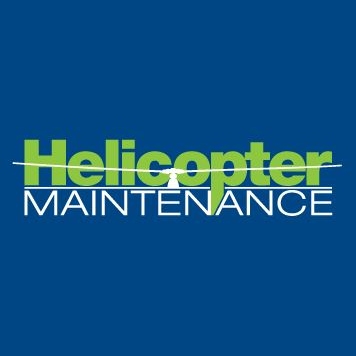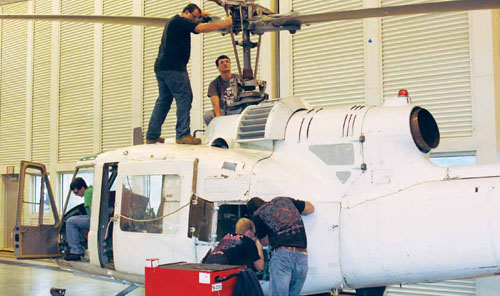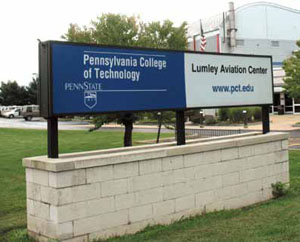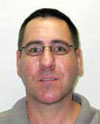
Helicopter Maintenance Training At The College Level


Bill Stepp | Contributing Authors
Williamsport, Pennsylvania may ring a familiar note in your mind, as it is the yearly home of baseball’s Little League World Series. It is also the home of the Pennsylvania College of Technology (PCT) and is affiliated with Pennsylvania State University (PSU). Established in 1989 as an applied technology college, the school offers certificate, associate and baccalaureate degree programs in more than 100 fields of study. The school employs more than 300 full-time faculty and serves approximately 6,600 students. The PCT Aviation Center is a 50,000-square-foot state-of-the-art facility with four classrooms, seven labs, two engine test cells, a paint booth and an 11,000-square-foot hangar. The college maintains a fleet of six rotor-wing aircraft (three are on loan from Sikorsky Aircraft Corporation) and 15 fixed-wing reciprocating and turbine-powered aircraft.
Providing quality training for current and future aviation maintenance professionals is the primary goal of PCT’s Aviation Center. This goal is met through a variety of courses that include FAA Part 147 training for the FAA A&P mechanic certification, college degrees, applicable elective courses and manufacturer training.
Training Programs
The A&P certificate program is designed for the student who may not be seeking a college degree yet desires to be an FAA-certified mechanic. This program exceeds FAA Part 147 requirements in many subject areas. Through the Industry Advisory Committee, PCT staff has elected to provide more training hours in the electricity portion of the course and has developed stand-alone helicopter and composite courses that are required for all students.
The associate of applied science degree builds on the A&P certificate program by requiring additional college general education courses in math, English, science and computers.
 There are two bachelor of science degree opportunities for students. The bachelor’s degree in aviation maintenance technology (BAV) emphasizes courses in advanced aviation electronics and flight line testing. The BAV students are eligible for internships before their junior and senior years. Some companies that have provided students with intern positions include Sterling Helicopter, Phillip Morris, Hess, Sheetz, Gulfstream, Duncan Aviation, Lycoming Engines and the Pennsylvania Bureau of Aviation, to name a few. The BAV degree requires that a Capstone project be completed. This project is generally in an area of interest to the student; some recent projects include avionics installations of a Stormscope, an Argus, and an Avidyne, repainting aircraft, repair and recovering fabric wings, repair and construction of sheet metal aircraft, and restoration of the only remaining Piper PT-1 aircraft. The bachelor’s degree in technology management (BTM) emphasizes management courses and can be completed totally online. Students interested in this degree must first have earned an associate’s degree from an accredited institution.
There are two bachelor of science degree opportunities for students. The bachelor’s degree in aviation maintenance technology (BAV) emphasizes courses in advanced aviation electronics and flight line testing. The BAV students are eligible for internships before their junior and senior years. Some companies that have provided students with intern positions include Sterling Helicopter, Phillip Morris, Hess, Sheetz, Gulfstream, Duncan Aviation, Lycoming Engines and the Pennsylvania Bureau of Aviation, to name a few. The BAV degree requires that a Capstone project be completed. This project is generally in an area of interest to the student; some recent projects include avionics installations of a Stormscope, an Argus, and an Avidyne, repainting aircraft, repair and recovering fabric wings, repair and construction of sheet metal aircraft, and restoration of the only remaining Piper PT-1 aircraft. The bachelor’s degree in technology management (BTM) emphasizes management courses and can be completed totally online. Students interested in this degree must first have earned an associate’s degree from an accredited institution.
Penn College provides for students with prior FAA, A&P, or military experience to transfer credits for advanced standing toward a degree program.
Student Opportunities
Students at Penn College have the opportunity to supplement their educations through elective courses taught in other program areas of the college. Some credit courses students have used as open electives include avionics, electronics, welding, non-destructive testing (NDT), machining, AutoCAD, paint detailing, composite repair, quality assurance (QA), management, safety and environmental science.
Penn College offers opportunities for current maintenance professionals to improve their knowledge and skills through manufacturer training courses. The Lycoming Engine Service School and a disassembly/reassembly course are taught at the Penn College Aviation Center by PCT faculty. These courses are FAA-approved for IA renewal. Lycoming and the predecessors of PCT (Williamsport Technical Institute and Williamsport-Area Community College) have had a long-term relationship that goes back to 1929. The current partnership has been going strong for more than 16 years.
PCT is in the process of teaming up with a major helicopter manufacturer to host an OEM maintenance training course to be located at PCT’s Aviation Center. The course will be designed for aviation maintenance technicians to provide an in-depth focus on the servicing, inspection and maintenance of each aircraft system. The theoretical training will be reinforced by hands-on practical and scenario-based training exercises utilizing actual helicopters to perform maintenance tasks. In addition, the OEM training assets will be available to supplement the hands-on portions of PCT’s Part 147 Aviation Programs and provide senior students opportunities for their senior projects.
Some advantages PCT provides for students include certifications and accreditations. Besides being an FAA-certified Part 147 training school, PCT is also an FAA-certified Part 145 Repair Station. This status allows students the opportunity to work on active aircraft under supervision to gain “real-world experience.” PCT is accredited by the Commission on Higher Education of the Middle States Association of Colleges and Schools. The Commission on Higher Education is an institutional accrediting agency recognized by the U.S. Secretary of Education and the Commission on Recognition and Postsecondary Accreditation. Another accreditation is by the National Center for Aircraft Technician Training (NCATT). PCT students are eligible to take the NCATT certification tests in their junior and senior years.
A stand-alone helicopter course is part of the Part 147 curriculum. Through a suggestion from our Industry Advisory Committee, we began to increase the amount of classroom and lab time over and above the small amount the FAA requires. This class has excited student interest in helicopter maintenance and resulted in many students pursuing careers in the helicopter industry. The Helicopter Association International’s Technical Committee has helped encourage student interest in pursuing a career in helicopter maintenance by offering scholarships for manufacturer training schools through the Helicopter Foundation International’s Bill Sanderson scholarship. Five Penn College students have been awarded this scholarship to date. PCT helicopter training equipment includes operational Bell UH-1B and Hiller UH-12 helicopters, as well as a BO-105 helicopter and rotor heads from a Sikorsky S-76, Bell 206, MD 900 and AS350. Equipment on loan from Sikorsky that is also available to students includes two Sikorsky/Schweizer S-300s and a Sikorsky S76A.
PCT faculty has diverse aviation experience. One member was awarded the Charles Taylor Master Mechanic Award in 2005 and has worked in aviation for 56 years. No matter your educational goal, Penn College offers many opportunities for you to achieve it. PCT is located in north central Pennsylvania and is a special mission affiliate of Penn State University. The PCT aviation program is housed in the Lumley Aviation Center located at the Williamsport Regional Airport.
 William Stepp, Ed.D., is an associate orofessor of aviation technology and has 30 years of fixed- and rotor-wing aviation experience. He is an FAA-certified A&P, I.A. and private pilot, and is an NCATT-certified AET.
William Stepp, Ed.D., is an associate orofessor of aviation technology and has 30 years of fixed- and rotor-wing aviation experience. He is an FAA-certified A&P, I.A. and private pilot, and is an NCATT-certified AET.
